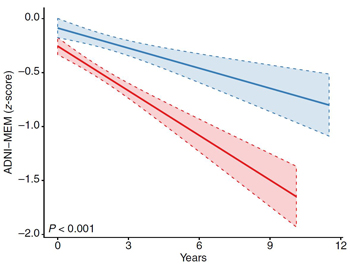Increased soluble TREM2 in cerebrospinal fluid is associated with reduced cognitive and clinical decline in Alzheimer’s disease
Science Translational Medicine, 28 Aug 2019
| Authors/Editors: |
Michael Ewers Nicolai Franzmeier Marc Suárez-Calvet Estrella Morenas-Rodriguez Miguel Angel Araque Caballero Gernot Kleinberger Laura Piccio Carlos Cruchaga Yuetiva Deming Martin Dichgans John Q. Trojanowski Leslie M. Shaw Michael W. Weiner Christian Haass for the Alzheimer’s Disease Neuroimaging Initiative |
|---|---|
| Publication Date: | 2019 |
| Type of Publication: | Journal Article |
 Loss of function of TREM2, a key receptor selectively expressed by microglia in the brain, contributes to the development of Alzheimer’s disease (AD). We therefore examined whether soluble TREM2 (sTREM2) concentrations in cerebrospinal fluid (CSF) were associated with reduced rates of cognitive decline and clinical progression in subjects with AD or mild cognitive impairment (MCI). We measured sTREM2 in CSF samples from 385 elderly subjects, including cognitively normal controls, individuals with MCI, and subjects with AD dementia (follow-up period: mean, 4 years; range 1.5 to 11.5 years). In subjects with AD defined by evidence of CSF Aβ1–42 (amyloid β-peptide 1 to 42; A+) and CSF p-tau181 (tau phosphorylated on amino acid residue 181; T+), higher sTREM2 concentrations in CSF at baseline were associated with attenuated decline in memory and cognition. When analyzed in clinical subgroups, an association between higher CSF sTREM2 concentrations and subsequent reduced memory decline was consistently observed in individuals with MCI or AD dementia, who were positive for CSF Aβ1–42 and CSF p-tau181 (A+T+). Regarding clinical progression, a higher ratio of CSF sTREM2 to CSF p-tau181 concentrations predicted slower conversion from cognitively normal to symptomatic stages or from MCI to AD dementia in the subjects who were positive for CSF Aβ1–42 and CSF p-tau181. These results suggest that sTREM2 is associated with attenuated cognitive and clinical decline, a finding with important implications for future clinical trials targeting the innate immune response in AD.
Loss of function of TREM2, a key receptor selectively expressed by microglia in the brain, contributes to the development of Alzheimer’s disease (AD). We therefore examined whether soluble TREM2 (sTREM2) concentrations in cerebrospinal fluid (CSF) were associated with reduced rates of cognitive decline and clinical progression in subjects with AD or mild cognitive impairment (MCI). We measured sTREM2 in CSF samples from 385 elderly subjects, including cognitively normal controls, individuals with MCI, and subjects with AD dementia (follow-up period: mean, 4 years; range 1.5 to 11.5 years). In subjects with AD defined by evidence of CSF Aβ1–42 (amyloid β-peptide 1 to 42; A+) and CSF p-tau181 (tau phosphorylated on amino acid residue 181; T+), higher sTREM2 concentrations in CSF at baseline were associated with attenuated decline in memory and cognition. When analyzed in clinical subgroups, an association between higher CSF sTREM2 concentrations and subsequent reduced memory decline was consistently observed in individuals with MCI or AD dementia, who were positive for CSF Aβ1–42 and CSF p-tau181 (A+T+). Regarding clinical progression, a higher ratio of CSF sTREM2 to CSF p-tau181 concentrations predicted slower conversion from cognitively normal to symptomatic stages or from MCI to AD dementia in the subjects who were positive for CSF Aβ1–42 and CSF p-tau181. These results suggest that sTREM2 is associated with attenuated cognitive and clinical decline, a finding with important implications for future clinical trials targeting the innate immune response in AD.
Please click on the following link for access to full text: Research Article
or download reprint here.
Related Links
- Science Translational Medicine: DOI 10.1126/scitranslmed.aav6221
- Immunabwehr im Gehirn als Schutzfaktor? (Pressemeldung LMU)
- Ein Schutzfaktor gegen Alzheimer? (Pressemeldung DZNE)
- Protective immune response in the brain? (Press release LMU)
- A Protective Factor Against Alzheimer’s Disease? (Press Release DZNE)
- Immunabwehr im Gehirn als Schutzfaktor? (Pressemeldung KUM)
- NIH director's Blog: New Study Points to Targetable Protective Factor in Alzheimer’s Disease



